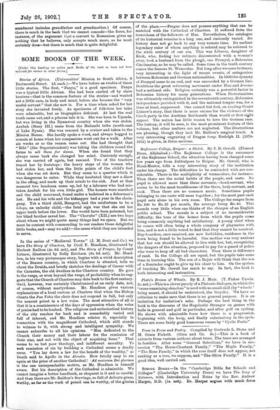SOME BOOKS OF THE WEEK.
[Under this heading we notice such Books of the week as have not been 'reserved for review in other forms.]
Stories of Africa. (Universities' Mission to South Africa, 9 Dartmouth Street. ld. each.)—We have before us twelve of these little stories. The first, "Panya," is a good specimen. Panya was a typical little African. She had been carried off by slave hunters—that is the common feature of the stories—and wanted not a little care, in body and mind, before she became the " very useful servant" that she now is. For a time when asked for her story she invented freely. As specimens of folk-lore her tales were admirable, but as biographies deficient. At last the real truth came out, and a piteous tale it is. She was born in Uganda, but was living in the Nyamwezi country when she was stolen. Azubah (Story III.) came from the Malumbi tribe (north-east of Lake Nyasa). She was rescued by a cruiser and taken to the Mission House. She hardly spoke a word, and always begged to remain at home when her companions went out for a walk. After six weeks or so the reason came out. She had thought that " Bibi" (the Superintendent) was Wring the children round the farms to sell them for slaves. When she found that they always came back she changed her mind. Curiously enough, she was carried off again, but rescued. Two of the teachers traced her by footsteps : the heavy steps of the woman who had stolen her, and then the little prints of the child's feet when she was set down. But they came to a quarter which it was dangerous to enter. While they hesitated they saw a dhow in the offing, and made up their minds to the risk. Just at that moment two headmen came up, led by a labourer who had mis- taken Azubah for his own little girl. The houses were searched and the child recovered, found under a bedstead in a fisherman's hut. He and his wife and the kidnapper had a year in the chain- gang. Yet a third child, Mangovi, had the misfortune to be a kikego, an unlucky child,—the fatal sign was that she cut her upper teeth before the lower. She would have been poisoned, but her blind brother saved her. The "Cherubs" (XII.) are two boys about whom we might quote many things had we space. But we must be content with commending to our readers these delightful little books, and—may we add P—the cause which they are intended to serve.






































 Previous page
Previous page